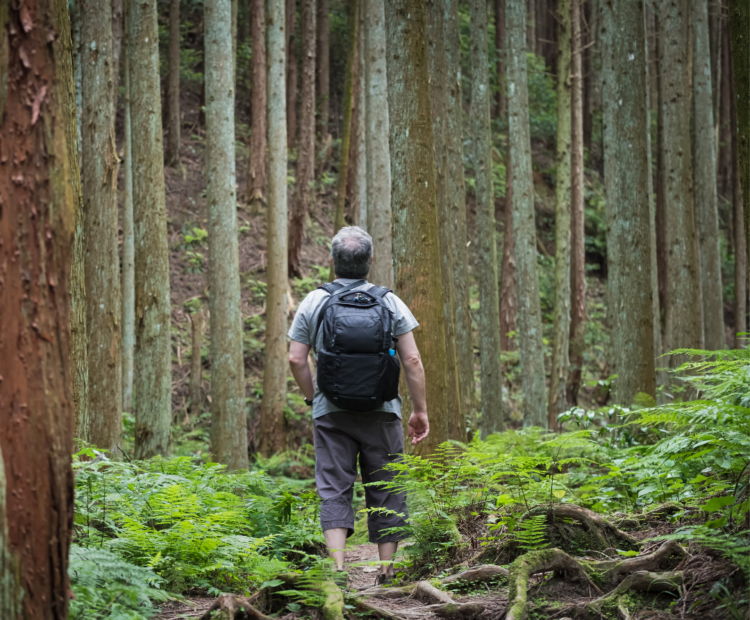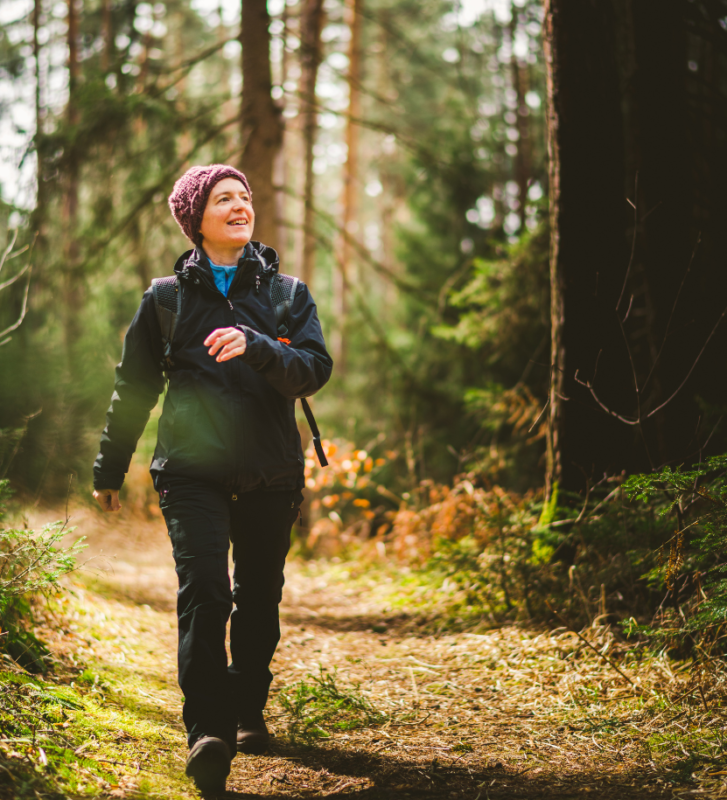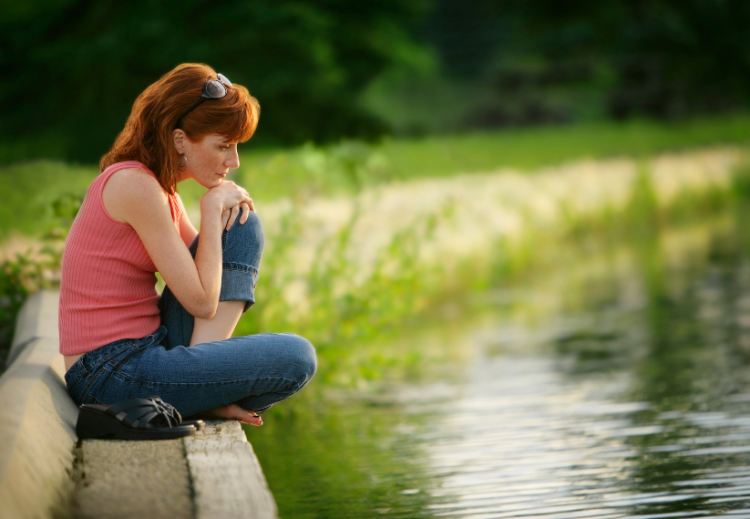So far, my post series on Nature and Health covered ways that nature makes us healthier. It can protect our bodies from disease and improve out mental health. However, immersion in nature does more than just prevent problems. It can also help us be at our very best. There is an amazing amount of research on how being outside boosts brain power. In other words, by engaging with nature, you can hack your mind to be more effective. Let’s learn the science of how the natural world can super-charge your brain to help you with your career and everyday life. In this post, I’ll cover the basic benefits of outside-time on mental performance.
If you’d like a crash course in nature’s ability to boost our creativity, check out my 2022 TEDx talk below!
So, let’s explore 7 ways that being outside boosts brain power!
1. It restores concentration and attention.

Many people find their ability to concentrate depleted and drained on a day-to-day basis. Our modern lives involve urgent, shifting and constant demands on our concentration. Additionally, we have to switch out attention between tasks quickly and frequently.
As a result, many people suffer from burnout. Our ability to pay attention takes a hit, and it’s hard to focus and get things done. Fascinatingly, scientific research repeatedly demonstrates how exposure to natural environments can restore focus. Specifically, it restores our ability to devote our attention to things.
Attention restoration theory explains that when we spend time in nature, we find soft fascination in what we see and encounter. These inherently fascinating stimuli are not urgent or demanding, but gently get our mind working. Additionally, we can let our mind wander and move freely between topics and objects. This sort of exposure results in a restoration of our brain’s capacity to concentrate.
By contrast, urban environments have loud sounds and pressing stimuli that can exhaust our brains. Busy work schedules, stressful deadlines, multi-tasking, and long hours can all do the same. Spending a few hours in nature every week can counteract those effects and have your brain at its best. In fact, some researchers have even advocated its use as a treatment for Attention Deficit/Hyperactivity Disorder (ADHD).
However, this is only one of many ways that being outside boosts brain power.
2. It boosts creativity and cognitive function.

Creativity and problem-solving are some of the most advanced functions of human brains. As a species, our brains are better at those activities than all other animals. Furthermore, they play a major role in our lives. New ideas and ways of looking at the world can help us overcome problems and difficulties.
In the business world, innovators, entrepreneurs, and business leaders need creativity to keep their strategies agile and adaptive. In other words, creativity and cognitive function are important whether you’re a CEO or a person dealing with every-day challenges.
Our pre-frontal cortex plays a major role in our ability to make good decisions and find innovative solutions. Scientists call these executive processes and cognitive function. Among other things, they include:
- Learning
- Critical thinking
- Reasoning
- Problem solving
Nature’s benefits to creativity
The scientific evidence around nature’s ability to enhance creativity and innovation is building rapidly. In one study, people who participated in a four-day wilderness experience scores better on creativity tests. In parallel with attention restoration, outside-time boosts flexible forms of thinking that lead to creativity. Other work shows that walking in nature help people invent better analogies, metaphors and conceptual connections in their thinking. In turn, these can lead to paradigm shifts and new approaches to problems. If you need a new perspective or are stuck on a problem in work or in life, try taking a break for some time outside.
3. It lifts your mood.

Our brains work better when we’re happier. For example, when people are in a good mood, it’s easier to overcome difficulties and accomplish tasks. When I’m feeling good, I’m less likely to give up if I don’t immediately succeed.
In fact, I’m more likely to stick it out and learn something along the way. Another way that being outside boosts brain power is by improving our mood. This makes problems feel easier to tackle and keeps us on track for success. Similarly, if our brains are clouded with angry or sad thoughts, nature exposure can lift our spirits.
A 2007 study found that people reported feeling more upbeat and happy, and diminished feelings of anger after walking around a nature preserve. Since then, dozens of studies have shown that spending time in nature increases happiness and helps people get past negative feelings. Interestingly, this effect doesn’t just come from getting out of the house. People report having greater increases in mood and positive thoughts from walking outside than those walking in urban or indoor environments.
4. It helps you sleep better.

Our brains and bodies function best when we’re well-rested. Sleep plays a key role in maintaining our brain’s sharpness and ability. As with mental health, experiences in nature boost sleep, which comes with a variety of benefits. For example, people with insomnia due to medical issues were able to fall asleep faster and stay asleep longer after spending time in the woods.
Generally, scientists attribute this better sleep to natural light cycles, changes in our body’s melatonin levels, and sleep-boosting airborne plant chemicals. If you’re feeling behind on sleep, don’t sleep on a nature walk as a perfect solution to catching better Z’s!
5. It restores mental sharpness after stress

Many people experience a decrease in their cognition or mental sharpness after stressful events. As my post on how nature reduces stress explains, spending time outside is a great way to cope with stress. Not only does it make you feel less stressed in the moment, but it helps you recover more quickly.
The same goes for clear thinking and cognitive abilities. As a recent study reviewed, loads of scientific research demonstrates that people who spend time in nature recover their mental sharpness faster. If stressful events or situations are putting the pressure on your brain, consider going on a hike or birdwatching trip. The results may surprise you!
6. It prevents and reverses burnout.

People all over the world are experiencing exhaustion and burnout from difficult working conditions, COVID, and global conflict. This sort of exhaustion can make your brain feel tired and fuzzy, making ordinary tasks difficult.
Unfortunately, burnout often strikes when we need it most, and makes even small problems seem unmanageable. As you might have guessed, nature exposure provides major benefits here, too. For instance, a recent study on nature-based rehabilitation found that outdoor activities like gardening helped people recover from exhaustion.
Even getting half an hour or more in nature a couple times of a week can add up to serious benefits over time. Within 14 weeks, many people in that study reported feeling significant increases in energy levels.
7. It improves memory.

Memory and learning are also important functions of healthy brains. Furthermore, they are essential to many life skills. For instance, both memory and learning ability are in high demand for students and professionals in training.
Our ability to retain information, and take in new information shapes how well we can pick up skills and learn about the world. By now, you can probably see where this is going. You guessed it: outdoor time can help with that too!
For example, young adults that took a 50-minute nature walk performed better on memory tests than those who did not. In fact, there whole lists of research reports supporting this claim. Even things as simple as having office plants or a view of a natural area from your window can provide some of these benefits.
This is yet another example of how being outside boosts brain power.
Thanks for reading!
Have you experienced brain-boosting effects while hanging out in nature? Do you have other tips for gaining these great benefits, or putting them to use in business? We’d love to hear about it! Share with us in the comments or via the Contact page. Be sure to share this post on Social Media and let us know your thoughts!

